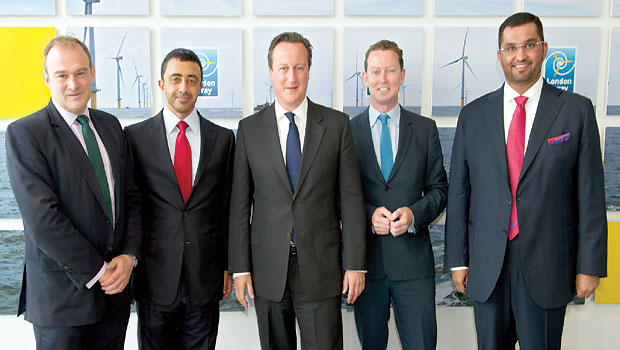
From left to right: UK secretary of state for energy and climate change Ed Davey, UAE foreign minister Abdullah Bin Zayed Al Nahyan, British PM David Cameron, UK minister of state at the Department of Energy and Climate Change Greg Barker, and
UAE minister of state and CEO of the Abu Dhabi-based Masdar Dr. Sultan Ahmed Al Jaber (Asharq Al-Awsat).
Margate (UK), Asharq Al-Awsat—British Prime Minister David Cameron and a number of ministers and diplomats from the United Arab Emirates (UAE) and European countries gathered yesterday in Margate, UK, for the inauguration ceremony of the “London Array”, the world’s largest offshore wind farm.
Present at the ceremony, together with Cameron, were Abdullah Bin Zayed Al Nahyan, foreign minister of the UAE; Dr. Sultan Ahmed Al Jaber, minister of state and CEO of the Abu Dhabi-based Masdar; and AbdulRahman Ghanem Al Mutaiwee, the UAE Ambassador to the UK.
Cameron said: “This is a very important day for Kent County and Britain. The London Array has been established thanks to the concerted efforts and expertise of engineers from all joint-stock companies, in addition to the workers and the sea captains of the people in the region. We are confident that the project will bring significant benefits to Kent for the coming years.”
Abdullah Bin Zayed Al Nahyan said his country is proceeding with efforts to consolidate its position as a main global provider of conventional and renewable energy.
The UAE foreign emphasized, “The UAE has considerable experience in the field of energy and has abundant reserves of hydrocarbon resources. Based on this experience, our vision for the future is aimed at ensuring energy security through diversification of sources, given that continued economic and social growth and sustainable development require ensuring energy security.”
He added that “the United Arab Emirates, through Masdar, has made great efforts to promote the spread of renewable energy solutions within the state and around the world.”
He stressed the importance of promoting access to “clean and renewable energy in small countries and developing communities, because without energy, these countries will not be able to meet their development goals.”
For his part, Dr Sultan Ahmed Al-Jaber told Asharq Al-Awsat that this project “is considered an addition to the relations between the United Arab Emirates and the United Kingdom, who already share historical relations and close ties. This project also embodies Abu Dhabi and the UAE’s pioneering position in the energy sector, both conventional and renewable.”
“We consider it an important achievement that we were able to accomplish in a very short time, through a strategic partnership and a special relationship with the government of the United Kingdom; this project will be a university acclaimed milestone in the energy sector,” he added.
The CEO of Masdar also said: “We started this project by pitching the idea to our partners as well as to the government of the United Kingdom and found a good response for implementing and developing the project and also creating the mechanisms and regulatory frameworks that have contributed to the success of this project. The British government should be commended for its role in creating frameworks that contributed to the success of the project.”
Dr Al-Jaber explained to Asharq Al-Awsat that, in 2009, the British government re-assessed its options on the energy front and alternative strategies were proposed to strengthen the sector, including offshore wind energy options that could encourage investors.
The UAE’s ambassador to the UK, AbdulRahman Ghanem Al Mutaiwee, told Asharq Al-Awsat that “there are future partnership projects between the two countries. Future challenges have to do with taxes and transferring the interview and “this is what we are currently working on.”
He stressed that by the end of next October “the entry of UAE nationals to Britain will be facilitated by visa exemption for tourists and investors. This, however, does not apply to students or those who wish to stay.”
Also present at the ceremony were ministers from Germany, Denmark, and the UK, including Ed Davey, UK’s secretary of state for energy and climate change; Greg Barker, UK’s minister of state at the Department of Energy and Climate Change; CEOs of companies that contributed to the project; as well as a large number of officials from Kent County in Britain.
Bader Lamki, director of the Clean Energy sector in Masdar, told Asharq Al-Awsat that the “London Array” has a production capacity of 630 megawatts, enough to meet the electricity needs of half a million homes in Britain. The cost of the project amounts to GBP 2.2 billion (USD 3.2 billion).
The station, which became fully operational on Thursday, is located at the mouth of the Thames River, and began to generate electrical power for the first time in October 2012. Masdar, in partnership with the German E.ON and the Danish DONG launched the project gradually in October last year and it has now reached its maximum production capacity.
Construction work on the project began in July 2009, with a substation constructed on the north coast of Kent, to export the power generated by “London Array” directly to the national electricity grid.

Trackbacks/Pingbacks